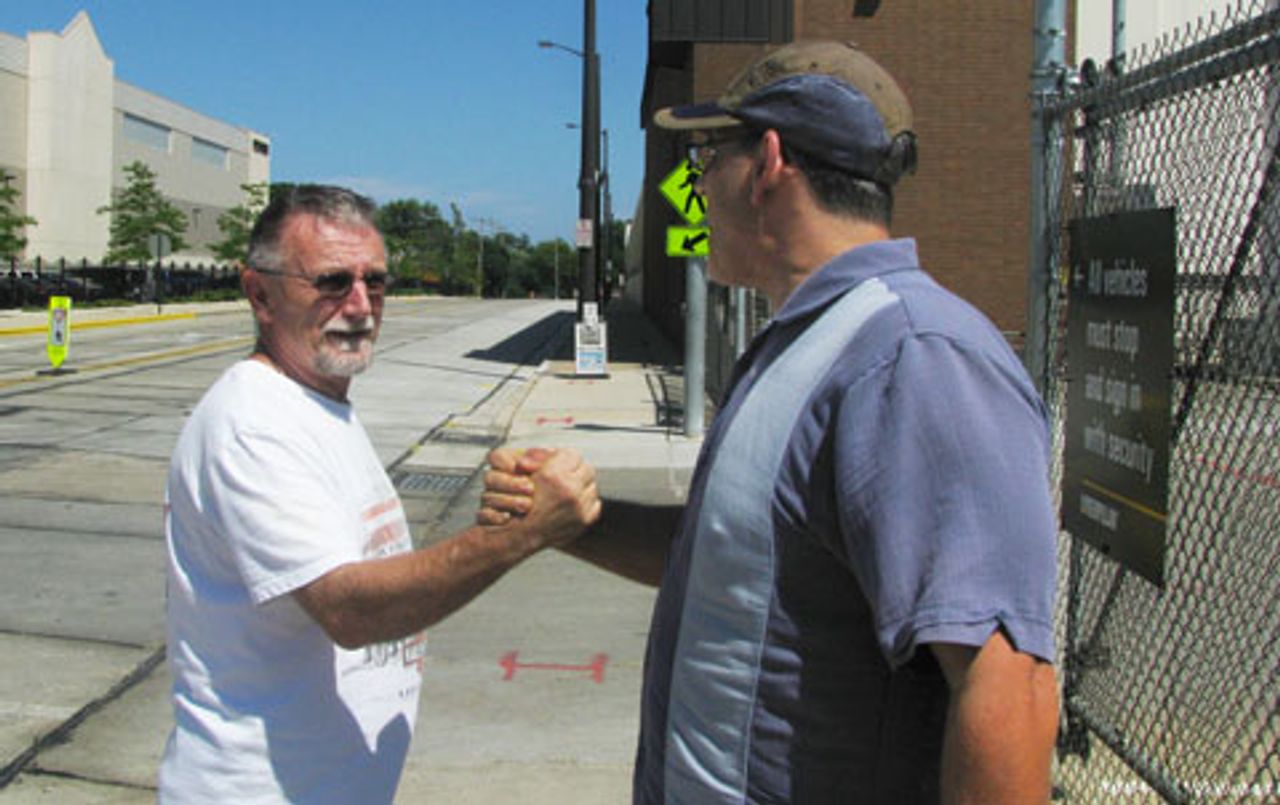After just three days of campaigning, volunteers for the Socialist Equality Party have collected over half of the required 2,000 signatures to get on the ballot in Wisconsin for the November 6 general election.
 White and Scherrer campaign at the Caterpillar plant in South Milwaukee
White and Scherrer campaign at the Caterpillar plant in South MilwaukeeOn Monday, a campaign team visited Caterpillar’s “Global Mining” equipment plant in South Milwaukee and spoke to workers about the 2012 election campaign of Jerry White and Phyllis Scherrer.
The 800 workers at another Caterpillar plant in Joliet, Illinois have been on strike since May 1. They are refusing to accept a six-year contract that includes a sharp increase in out-of pocket healthcare costs, a pension freeze, a de facto 15 percent pay cut, and a lack of job security measures.
Though workers in Joliet are organized under the International Association of Machinists, the workers in South Milwaukee are under the control of the United Steel Workers. Both unions have played a treacherous role in imposing anti-worker contracts.
The campaign team spoke with workers about the prospect of Caterpillar imposing a similar contract on workers in South Milwaukee.
Mark, a middle-aged worker, was asked if he had a message for his fellow workers in Joliet: “Yes, hang tough… This is our future too, and we have got to keep our eyes open. There’s a new contract coming in May. What’s going to happen to us? We’re going to see what they [Caterpillar] are going to do.”
Mark agreed with White’s statement that there is no fundamental difference between the two main candidates in the 2012 election.
 Jerry White greets a Caterpillar worker
Jerry White greets a Caterpillar workerAnother male worker with 7 years responded positively to White’s call to unite workers around the world against reduced pay. “That’s good,” he said.
A female worker told White that she was aware of Caterpillar’s plans to present South Milwaukee workers with a contract similar to the contract offered to Joliet workers. She expressed a lack of faith in the trade union apparatus and explained that she already had another job lined up.
Guy, a worker with 10 years, was asked if he thought that the union would fight for the workers if the company produced a sham contract next year. “I try not to think about it,” Guy responded.
White explained that the union’s role is to collaborate with management to impose wage and benefit cuts on workers.
“I believe that,” Guy said, “The unions are in business with management… It’s BS.”
Another worker was angry with the wage cuts being imposed around the country: “That’s not cool,” he said. When White explained the role of the unions in the shutdown of a Caterpillar plant in London, Ontario, the worker replied that “all of these [jerks], that’s where they want to take us.”
Dennis voiced his frustration with the Democrats and Republicans for their handling of the financial crisis. “They haven’t done anything to the banks!”
When White compared the actions of the banks and their backers in the two big business parties to a criminal operation, Dennis exclaimed, “It is! I’ve been following this for years. I was there in Madison last year [protesting Governor Walker’s budget bill], I saw it.”
James, an older worker expressed gratitude for the SEP’s intervention. “Don’t stop coming here. We need to shake things up,” he told vice presidential candidate Phyllis Scherrer as he purchased a “Lessons of Wisconsin” Pamphlet.
On Sunday, Scherrer spoke with workers in Milwaukee. Joe Paterick, a sailing instructor, related his experience laying railroad track throughout the state of Michigan. “Next to mining, laying railroad track is one of the hardest jobs in the world.”
 Joe Paterick and Phyllis Scherrer
Joe Paterick and Phyllis ScherrerHis crew worked 14 hours a day, six days a week, for $14 an hour. “You feared firing all the time because of the high unemployment in Michigan.” He also mentioned that the state police regularly harassed Spanish-speaking rail workers about their immigration status during the few hours workers had in a day to eat and sleep.
Paterick then pointed to the large number of police patrolling the beach, and the hulking RV marked Milwaukee County Sheriff Mobile Command Post. He said, “These people are racist. They wouldn’t be out here if there weren’t black people from bad neighborhoods coming here. Everyone comes to the beach! There’s no crime going on, just look!”
Scherrer pointed out that the swelling police state apparatus is directed at the suppression of the entire working class, and not just minorities. She also explained how the issue of race has been and continues to be used to weaken the working class by dividing it into competing factions.
A young landscaper spoke to the SEP campaign team about dangerous working conditions that have worsened in recent years. She noted that the landscape business depended on super-cheap immigrant labor. “They [landscape workers] have no rights. My crew has been working and puking. They don’t take into account how hot it’s been. They have them illegally spraying herbicides with no protective gear, always pushing them to work harder rather than coming up with other options.”
She also said the current political system has left her apathetic, but expressed her interest in the SEP and donated to the campaign.
The SEP encourages all workers and youth to participate in the Wisconsin campaign and to help in our efforts to gather signatures and gain ballot-access. For more information and to get involved, visit socialequality.com.
